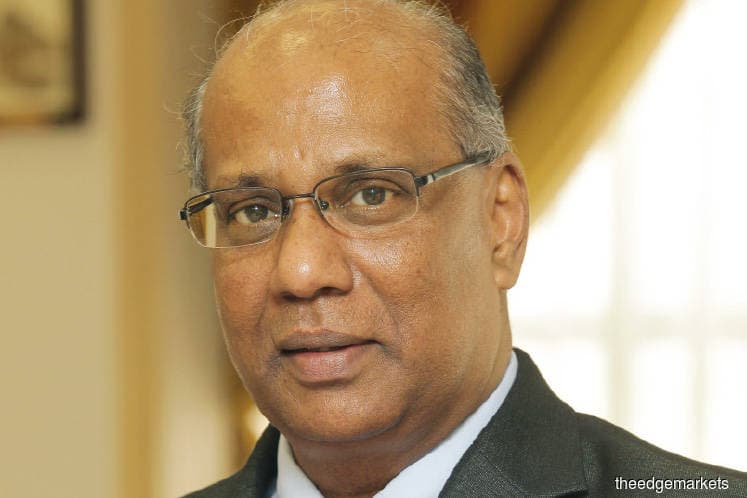
This article first appeared in The Edge Malaysia Weekly on April 9, 2018 - April 15, 2018
DIRECTOR General of Customs Datuk Seri Subromaniam Tholasy has given his assurance that there are no plans to review the Goods and Services Tax (GST) zero-rated supply list at present. Any change to the list would have to be handled carefully to avoid disruption to businesses, he adds.
“I think it is an appropriate list as it has taken care of the needs of the lower-income group. We’re continuously monitoring that [the list and consumption patterns] and if there is a need, we will make some revisions. But not now.”
Subromaniam acknowledges that any future change will be “the government’s call”, but he cautions that the list cannot be altered at will as it would be costly to businesses, especially at the retail level.
“For businesses, making changes at retail outlets is not as simple as keying in items to be zero-rated or standard-rated as it involves tweaking the system. Companies would need to get their IT people to look at it. It is not that simple and the whole supply chain will be affected.”
Subromaniam considers the current 6% as a fair rate, although he believes it was a huge problem for many because of the timing of the implementation — coming when the ringgit was depreciating fast and the price of crude oil was in a tailspin — which were factors beyond Malaysia’s control.
His assurance that the authorities are maintaining the status quo of zero-rated supply will help ease fears of cuts in the notoriously long list that benefits consumers but not businesses.
Coupled with exempted supply, the extensive zero-rated supply list is a nightmare for most businesses because of the complications it created.
Senthuran Elalingam, Deloitte Malaysia’s financial services indirect tax leader for Asia-Pacific, says a business would need to assess on a transaction-by-transaction basis whether a particular sale or purchase falls within one of the zero-rated, exempted or relief supply categories to determine the applicable GST rate. Substantial human resources and technology are required to accurately capture the information.
Although fewer exemptions would mean lower compliance cost, Senthuran thinks any change will need to be weighed against the additional cost to goods and services that are commonly purchased by the public, should GST be levied on those supplies.
Higher GST revenue would be useful to help the government meet its budgetary needs, and collections would be higher assuming full compliance. To that end, the Royal Malaysian Customs Department has been increasing its vigilance and GST revenue has been growing every year since the tax was introduced in April 2015.
Subromaniam forecasts a collection of RM45 billion this year or RM1.2 billion more than an earlier projection by the Finance Ministry of RM43.8 billion. A new programme called the Malaysian GST Compliance Assurance Programme (MyGCAP) is expected to prompt voluntary disclosures by enrolled companies that may have unintentionally or wrongly disclosed their payable dues.
Subromaniam sees MyGCAP as a game changer when it comes to encouraging voluntary compliance. Companies that enrol will enjoy many benefits: penalties will be waived for voluntary disclosure; applications will be simplified and automatically renewed; a dedicated officer will help with technical matters; and faster refunds.
Customs will also grant them an audit break in a four-year “step down audit”.
“It is not that the companies are out to cheat us. Sometimes, there could be issues with the software or the personnel managing the data input. GST is a transaction tax. Once a mistake is made, it will keep repeating itself until it is corrected. Companies are usually too busy to step back to look at everything as a whole,” observes Subromaniam.
“This is where MyGCAP comes in handy. Auditors certified by the Customs Department will look at a company’s GST system and in the process uncover mistakes, if any. At that point, the business can disclose voluntarily.”
He says companies that disclose voluntarily will receive consideration for a penalty waiver, although it would be done on a case-by-case basis. “I don’t want to punish them. The earlier they discover the discrepancy, the better for them.”
Even though Malaysia is into its fourth year of GST, Subromaniam believes informed compliance, or educating businesses, is the way forward. “I am a strong believer in informed compliance. People make mistakes because they don’t understand. Of course, for those who fraudulently declare or cheat, enforced compliance may be necessary.
“But by and large, many companies would want to comply and we want to focus on this group and help them. It will be very costly to impose enforced compliance because you need a big team for audit and that will disrupt businesses. Voluntary compliance can only be achieved if we collaborate with the industries.”
Save by subscribing to us for your print and/or digital copy.
P/S: The Edge is also available on Apple's AppStore and Androids' Google Play.